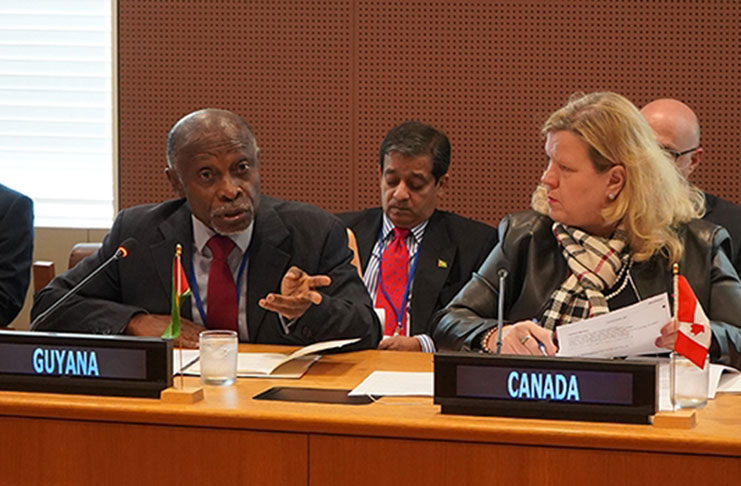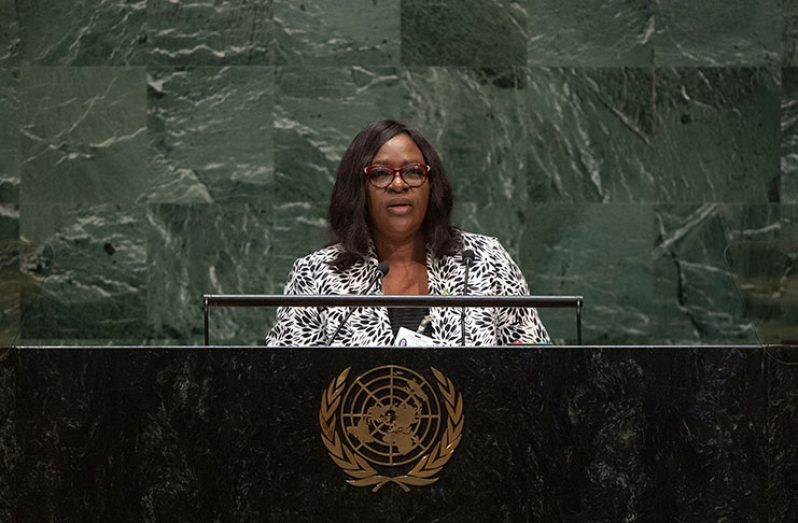…says will continue to place faith in ICJ to resolve border controversy
…as Maduro hardens refusal to pursue peace through respect for the rule of law
The Venezuela Government has refused to participate in next year’s hearing of the border controversy case to determine whether the International Court of Justice has jurisdiction in the case, but Guyana’s Foreign Affairs Minister, Dr Karen Cummings told the United Nations General Assembly on Saturday that this country has placed its faith in the world’s highest Court and will continue to do so.
The Guyana Chronicle reported last week that the ICJ, in March 2020, will begin hearing arguments on whether it has jurisdiction over the case filed Guyana – Arbitral Award of 1899 (Guyana v Venezuela). The Ministry of Foreign Affairs, in making the disclosure last Tuesday, said it welcomes the notification by the ICJ). The oral hearings will be held in The Hague from March 23 to 27, 2020. “This hearing will determine whether the Court has jurisdiction over the case filed by Guyana on March 29, 2018. By that case, Guyana seeks to obtain from the Court a final and binding judgment that the 1899 Arbitral Award, which established the location of the land boundary between then-British Guiana and Venezuela, remains valid and binding, and that Guyana’s Essequibo region belongs to Guyana, and not Venezuela,” the Foreign Affairs Ministry explained in a statement.
Guyana filed its case before the ICJ after United Nations (UN) Secretary-General, António Guterres, in January 2018, referred the controversy between Guyana and Venezuela to the world court. In taking his decision, the Secretary-General was exercising the power vested in him in the 1966 Geneva Agreement between Guyana, Venezuela and the United Kingdom to decide how the controversy should be settled, the Foreign Affairs Ministry explained.
In a letter to the Court, Venezuela contended that the Secretary-General exceeded his authority under the Geneva Agreement, and that the Court therefore lacks jurisdiction to adjudicate Guyana’s lawsuit. On that basis, Venezuela has indicated that it will not participate in the proceedings. On November 19, 2018, Guyana submitted its Memorial to the Court refuting Venezuela’s arguments and demonstrating that the Court has jurisdiction.
Meanwhile, in her debt address to the UNGA Dr Cummings said on some cardinal principles, these United Nations are indeed ‘united’. “The sovereign equality of all States, respect for the territorial integrity of every State, the peaceful resolution of disputes between all States, respect for the international rule of law – these are among the most effective guarantees of a world at peace. “Last year, from this podium, Guyana updated the world on the disregard for these principles that our neighbour, the Bolivarian Republic of Venezuela, continues to show in its controversy with Guyana. We showed how six months earlier, in March of last year, Guyana had acted on the decision of the Secretary-General of this Organisation to refer the controversy to the International Court of Justice under the Geneva Agreement of 1966 to which Venezuela is a party. It was a decision binding on Venezuela, but we warned of Venezuela’s unwillingness to participate in the proceedings. A year later, that warning is fulfilled. As we heard yesterday, Venezuela’s unwillingness to be involved in a judicial resolution has hardened into a refusal to pursue the path of peace through respect for the rule of law. Guyana has placed its faith in the world’s highest Court. It will continue to do so,” Dr Cummings told the assembly.

Commonwealth ministers
Only last week the Commonwealth Ministerial Group on Guyana was convened by the Commonwealth Secretary General, at the request of the Government of the Co-operative Republic of Guyana, and in accordance with a mandate given by the Commonwealth Heads of Government in 1999 to monitor “further developments in respect of the existing controversy between Guyana and Venezuela.”
The meeting was chaired by Bangladesh. In a statement the Group recalled that at the most recent Commonwealth Heads of Government Meeting, in London in April 2018, leaders had, “expressed their full support for the decision by the Secretary General of the United Nations issued on 30 January 2018, within the framework of the Geneva Agreement of 1966, to choose the International Court of Justice as the means that is now to be used for the settlement of the controversy between Guyana and Venezuela.
Heads noted then that the decision of the Secretary General, which was in accordance with the principles and purposes of the United Nations Charter, was intended to bring a peaceful and definitive settlement to a long standing controversy. Heads reiterated their unequivocal support for the maintenance and safeguarding of Guyana’s sovereignty and territorial integrity.”
At last week’s meeting the Group received a briefing from the Foreign Secretary, Carl Greenidge, who advised that further to the Government of Guyana’s filing of its application to the International Court of Justice on 29 March 2018, Venezuela continues to assert that the ICJ has no jurisdiction in the matter, notwithstanding the Geneva Agreement and the United Nations Secretary General’s choice of it, as a means of conclusive settlement. Greenidge also briefed the Group of reported developments of concern to Guyana in the maritime area of controversy; and, that Guyana has requested the Secretary General of the United Nations to place this issue on the Agenda of the General Assembly under the Item “Peace Building and Sustaining Peace” and that it also be brought to the attention of the Security Council.
According to the Commonwealth Secretariat having considered the update provided by Foreign Secretary Greenidge, the Group reiterated its support for the Government of Guyana to pursue a judicial course of action as the means through which the border controversy can be permanently resolved. In this regard, the Group welcomed the update that the International Court of Justice has notified Guyana that hearings on the jurisdiction of the Court will be held in The Hague, The Netherlands, from 23-27 March 2020. 7. The Group reiterated its unequivocal support for the maintenance of the sovereignty and territorial integrity of Guyana and its unimpeded right to the development of the entirety of its territory for the benefit of its people. 8. The Group also agreed to draw the conclusions of their meeting to the attention of all Commonwealth member governments.
Climate change
Dr Cummings also spoke about Guyana pursuit of transformative action to secure its advance as a modern, cohesive and prosperous state, including through the implementation of the 2030 Agenda for Sustainable Development and the SDGs.
Dr Cummings is leading Guyana’s delegation at the summit, which include Foreign Secretary, Carl Greenidge and Director General at the Ministry of Foreign Affairs Audrey Waddell. Dr Cummings told the world body that Guyana has incorporated the Agenda into its national development strategy – the Green State Development Strategy (GSDS): Vision 2040. The Green State Development Strategy is Guyana’s road map to becoming a ‘green state’. It emphasises the protection of our environment, enhancing prosperity and social cohesion and laying the foundation for the involvement of every citizen in sustaining a low-carbon trajectory of growth that is inclusive, diversified and climate-resilient.
As a low-lying coastal state, Guyana is particularly vulnerable to climate impacts. “Indeed, Guyana understands well the risks posed by climate change as we see daily evidence of the damage to the coastal zone, frequency of flooding in the hinterland, and extreme meteorological events. Guyana ranks highly among countries most vulnerable to natural disasters and this compels urgency on our part to institute adaptation and disaster risk reduction measures,” Dr Cummings told the assembly in her address.
She said however, beyond merely responding as an affected country, Guyana has long committed to exercising leadership in pursuing actions to help mitigate anthropogenic climate change. “Guyana has established the importance of global environmental services provided by our natural resources and under the Paris Agreement on Climate Change we have taken ambitious national action, particularly in partnership with Norway that we trust will continue to resonate positively and globally. These actions include the creation of a greenhouse gas inventory, the integrating of climate change into the academic curricula, and the ‘greening of towns’ initiative.”
The Foreign Affairs Minister said the science is clear and the recent report of the Intergovernmental Panel on Climate Change has reaffirmed that the agreed goals for carbon emissions set out in the Paris Accord are not sufficient to slow the rate of global warming and additional reductions are now required to slow and reverse impacts of climate change. “I take the opportunity to underscore, Mr. President, that the existentialist threat posed by climate change demands the urgent effort of all actors. We therefore applaud the fruitful discussions and positive momentum generated by Climate Action Summit held last Monday,” Dr Cummings said.
She said experience has shown that whether in combating climate impacts, expanding economic benefits or consolidating democratic norms extreme vigilance is required to safeguard hard-earned and cherished gains. Indeed, they must be attended with great care to avoid reversals.
Guyana, for instance, she said has had consistent economic growth that has been among the highest in our Region for several years resulting in the country now being classified a high middle-income country. “However, graduation has not caused many of the persistent difficulties to disappear but have reinforced the need in the face greater constraints in access to concessional resources for fiscal prudence and stability to achieve our core national objectives, including the continued reduction of the burden of poverty and the provision of increased and equitable access to all basic social services, particularly with respect to education and health, for all our citizens. This reality constrains us to be very studied in our approaches and we reiterate the call for the criteria to take vulnerability into account to be integrated in determining development progress.




.jpg)










